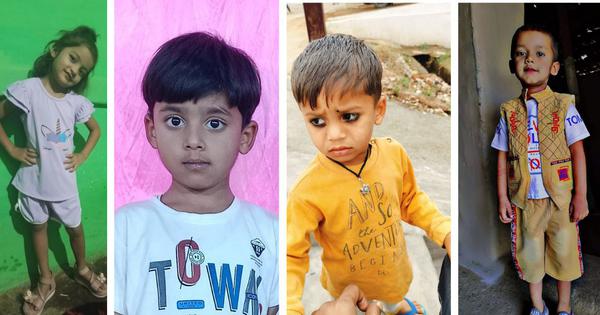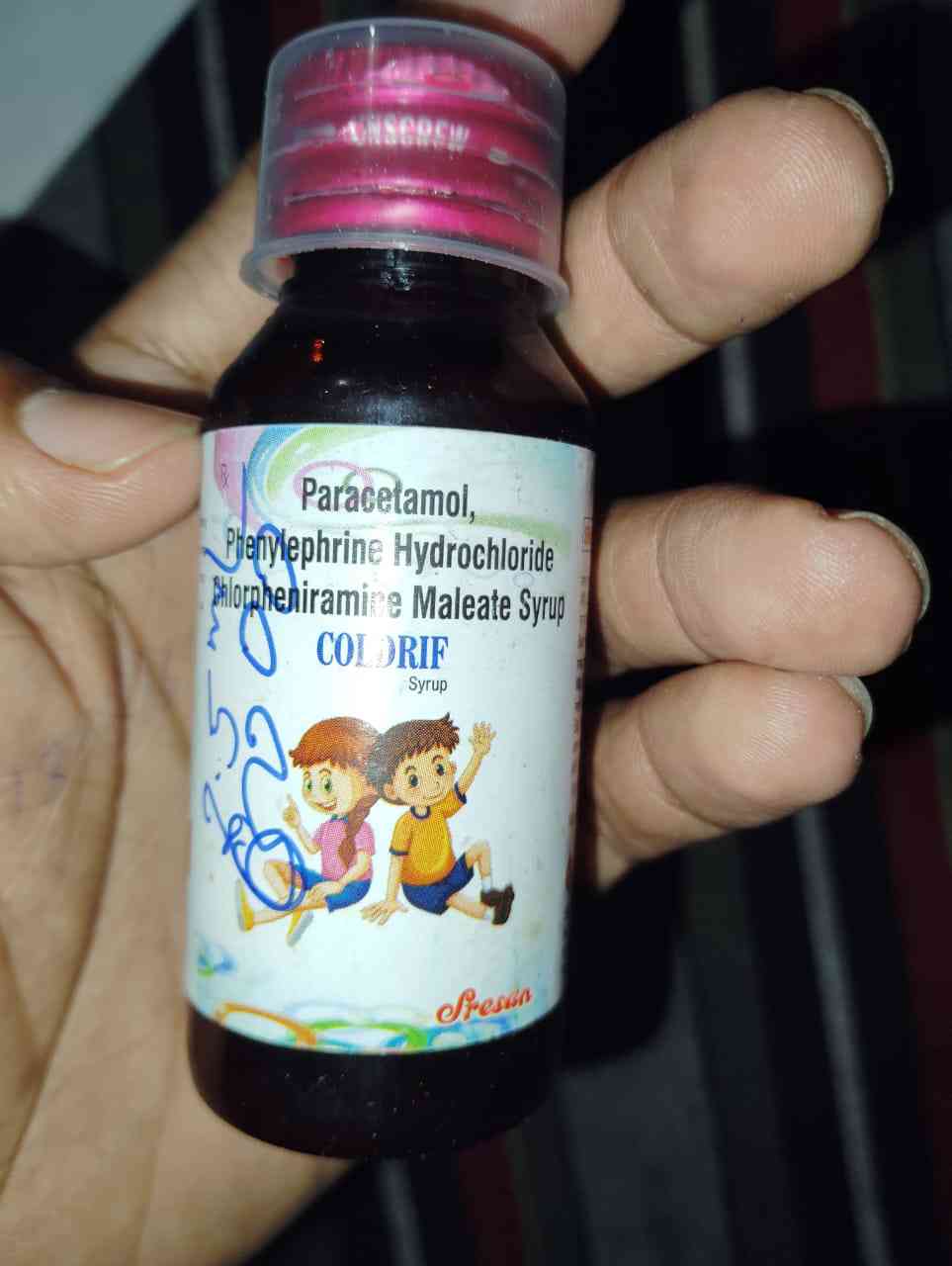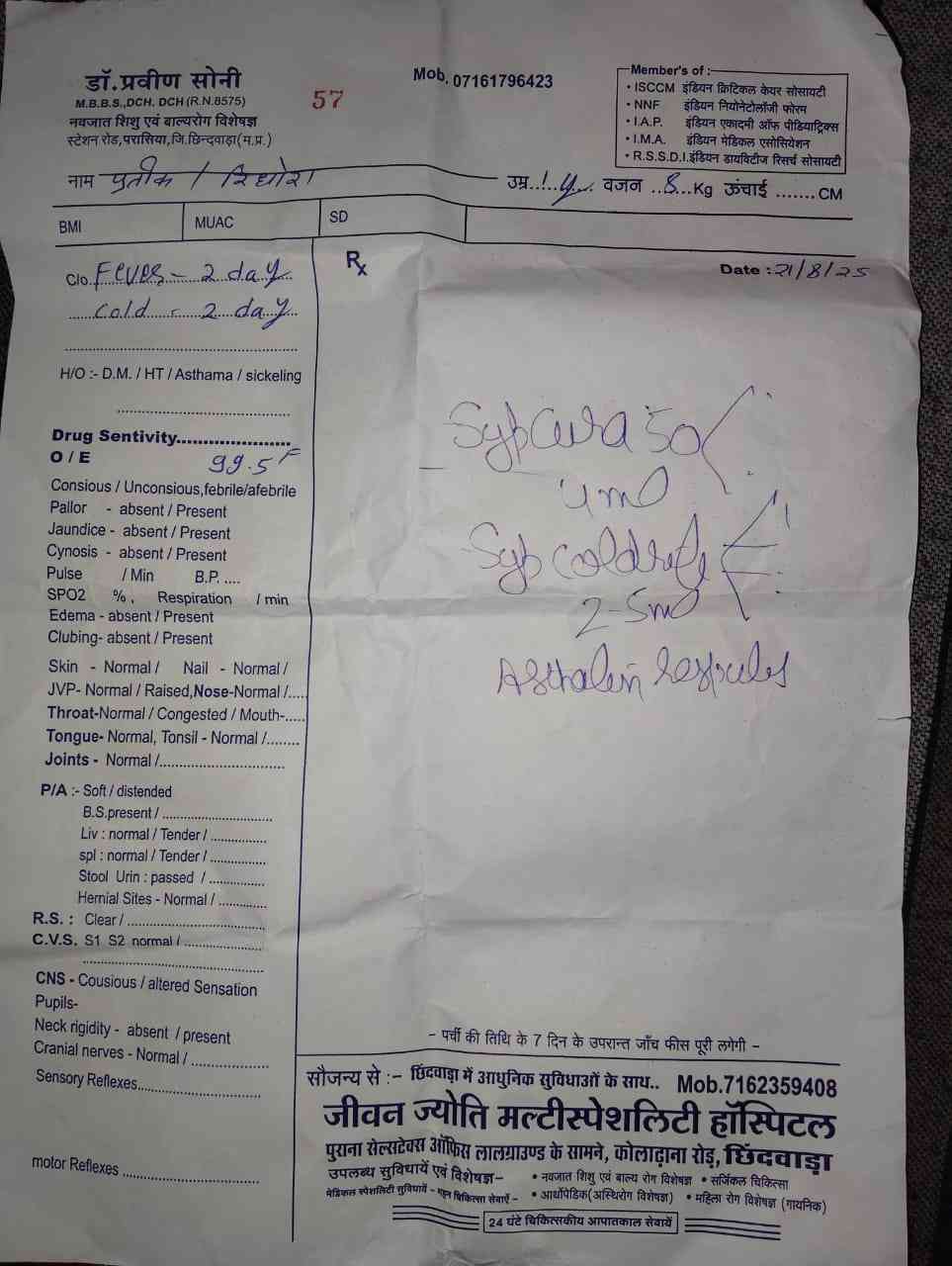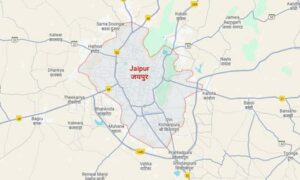
Two days before Rishika Peepre came down with a cough and cold on August 27, she was doing what five-year-olds do – dancing and playing.
That day, her father Suresh Peepre Khatik, a resident of Madhya Pradesh’s Sethiya village, took her to a local doctor who prescribed her cough syrup.
Rishika vomited the entire night after taking the medicine.
Three days later, she complained of severe stomach pain. Khatik admitted her to a hospital in Chhindwara.
Rishika had always been a healthy child but her condition deteriorated within a week. She was diagnosed with kidney failure and advised dialysis.
As no paediatric dialysis facility existed in Chhindwara, Khatik took her 120 km away to Nagpur’s Nelson hospital, where she underwent nine cycles of dialysis.
By September 16, Khatik ran out of funds. “Doctors said they cannot treat her if I don’t pay. So we got her discharged that day.”
Ten minutes after they left the hospital, Rishika died.
Since August, 11 children in Parasia – the tehsil in MP’s Chhindwara where Rishika lived – have died of kidney failure after consuming cough syrups. All were between the ages of one and six years. At least 10 others have been hospitalised.
All the children had been administered one of two cough syrups – Coldrif, manufactured by the Tamil Nadu-based Sresan Pharmaceutical and Nastro-DS, which was made by Himachal Pradesh-based Aquinnova Pharmaceuticals.
As the death toll increased, officials in Madhya Pradesh told Scroll that in late September they began to suspect that the cough syrup had been contaminated.
Their doubts were confirmed on October 2 when Tamil Nadu found the control batch of Coldrif cough syrup “adulterated” with 48.6% of diethylene glycol, a highly toxic chemical. Tamil Nadu drug inspectors had picked up the samples from Sresan’s Kancheepuram plant.
While the initial findings by Madhya Pradesh’s drug inspectors contradicted the Tamil Nadu report, on October 5 the state’s drug testing laboratory in Bhopal also found 46.28% of diethylene glycol in a sample of Coldrif cough syrup collected from a distributor.
This is not the first time cough syrups made in India and contaminated by diethylene glycol or DEG have led to deaths of children.
In 2023, 70 children had died in The Gambia after consuming cough syrups made in India. An inquiry by the World Health Organization had found the medicines adulterated with diethylene glycol. The same year, Uzbekistan blamed India-made cough syrups for the death of 18 children.
The tragedy in Chhindwara has left behind not just grieving families, but also a trail of debt.
“We not only lost our daughter, we also lost our entire savings in her treatment,” said Khatik, who spent Rs 9 lakh on Rishika’s treatment.
Khatik, who runs a meat shop, said all the women in his family mortgaged their jewellery to raise money for her treatment.
Several other families told Scroll that they had run out of money after paying lakhs in treatment. They complained of inaction and apathy from the state health department.
Nilesh Suryavanshi, whose three-year-old son Mayank is on a ventilator, alleged that the government has offered no financial assistance to the families. “Parents are struggling and taking their children to hospitals without any support,” he added.
Two cough syrups, two probes
A cough syrup requires a solvent to dissolve all its active ingredients – the compounds that make a drug effective – and to add sweetness and act as a lubricant. Usually, the solvent used is pharma-grade glycerine or propylene glycol, a clear, sweet and viscous liquid.
To cut corners, manufacturers knowingly or accidentally use a cheaper solvent called industrial glycerine, which is used to make cosmetics, a Maharashtra-based drug official told Scroll.
The industrial-grade glycerine can contain diethylene glycol and ethylene glycol, which if consumed can lead to vomiting, abdominal pain, kidney failure and often death.
All the children in Parasia who died showed these symptoms.
The use of diethylene glycol, or DEG, is banned in cough syrups. In its report, Tamil Nadu stated that DEG “is a poisonous substance which may render the contents injurious to health”.
Tamil Nadu’s findings were significant, since initially both the Union government and the Madhya Pradesh government found no anomalies in the cough medicine.
Six samples of the two syrups tested by Central Drugs Standard Control Organisation and three samples tested by the state drug laboratory in Madhya Pradesh initially were found “free of diethylene glycol/ethylene glycol”. The samples picked by CDSCO and the state government were from the same batch of drugs that the children consumed.
On October 3, Tamil Nadu issued a stop production notice to Sresan Pharma and banned the sale of Coldrif with immediate recall of the batches of medicine that had gone out to shops. Madhya Pradesh, Kerala, Rajasthan and Maharashtra followed suit.
Tamil Nadu also notified various states where the batch was distributed to stop its use. Sresan Pharmaceutical did not respond to an email from Scroll.
While Tamil Nadu was swift in response and tested the sample within a day, the Himachal Pradesh drug controller has been slower in its investigation of the other cough syrup consumed by the Chhindwara children, Nastro DS, made by Aquinnova Pharmaceuticals.
While samples of Nastro DS cough syrup were taken from Aquinnova’s Baddi unit, according to the unit’s incharge, the report of the tests has not been released.
Zatropha Pharma, which markets the cough syrup, in an email response to Scroll’s queries, said: “We have provided all the documents to the concerned drug authorities”. Rishabh Garg, a partner in Zatropha, told Scroll that the original manufacturer of the cough syrup is Aquinnova Pharmaceuticals, and questions should be directed to them.
Vikas Goyal, head of Aquinnova’s Baddi unit, told Scroll that they “have tested and cleared all laboratory requirements for the cough syrup”. “We only purchase pharmacopeia grade glycerine. We did not find DEG contamination in our syrup,” he said. Goyal added that the Himachal Pradesh drug controller has initiated an investigation.
Children are the most vulnerable to side effects of DEG poisoning. But as Scroll has reported, India’s drug rules do not mandate compulsory testing of DEG contamination in a cough syrup before it is cleared for sale.
“If this (testing) is made compulsory, we can detect many contaminated cough syrups before such tragedies occur,” the Maharashtra drug official said, requesting anonymity.

A doctor’s arrest
In Ridhora village, 13-month-old Prateek Pawar was amongst the first cases that caught the district administration’s attention. He developed a minor cough and cold on August 20.
His father Sanjay Pawar took him to Dr Praveen Soni in Parasia who prescribed Coldrif.
For five days, Prateek was administered 2.5 ml of cough syrup four times a day. By the third day, his urination completely stopped.
For over a month now, Prateek has been in various hospitals. He is currently in Nagpur’s Lata Mangeshkar hospital for treatment of acute kidney injury. He has undergone three cycles of dialysis.
His father, Pawar, said they have spent Rs 5 lakh till now.
“My son is still in the ICU but he is recovering,” said Pawar, a farmer. “I have exhausted my savings and borrowed money from several people to keep his treatment going.”
Pawar blames Soni for prescribing an excessive dose of the syrup. Soni, a medical officer with Madhya Pradesh government hospital in Parasia, also runs a private clinic.
Of the eight children under treatment in Chhindwara and Nagpur, four consulted Soni and the others consulted a doctor identified as Thakur.
Scroll has accessed the children’s medical records, as collated by the district health department. Of the eight, six are critically ill with kidney failure.
Kapil Pawar, whose two-and-a-half-year-old son Vedansh was treated by Soni, too, alleged that the doctor had prescribed a high dose of the medicine – 3 ml of Coldrif four times a day.
Vedansh fell ill in early September. A few days after taking the cough syrup, he stopped urinating. On September 9, he was rushed to a hospital in Chhindwara and then referred to Nagpur.
Pawar alleged that the treating paediatrician in Nagpur informed him that his son had “should have been administered not more than 1ml of the medicine.”
But Soni denied claims of incorrect dosage. He said that he has been prescribing Coldrif for a “few years”. “This problem has never occurred before. How a drug is manufactured is beyond my control,” he said, when he spoke to Scroll on October 3.
Two days later, Soni was suspended from the post of medical officer for practicing privately and for not swiftly detecting kidney ailment in children and initiating the correct treatment. The same day, he was arrested by Chhindwara police.
Jeetendra Jat, deputy superintendent of police in Parasia, told Scroll they had waited for the health department’s investigation before initiating action.
On October 3, the Union health ministry issued an advisory to all states to avoid prescribing cough and cold medication to children aged less than 2. The same advisory also noted that cough syrup is generally not given to children below the age of 5.
In Chhindwara, paediatrician Dr Poonam Jain said she is flooded with cases of children who had the common flu, took either of the cough syrups, and fell severely ill since late August. Only a handful of patients are responding to medicines, she said.
Dr Pavan Nandulkar, another paediatrician, said children coming to him reported creatinine levels of 4-5, which is five times the normal. “Such levels mean the child will eventually suffer toxin-mediated kidney injury. The cause of death of all children who were referred to Nagpur hospitals was this,” Nandurkar said.

Absent government
Families of the children have been going from one hospital to the other for treatment, often at prohibitive costs.
Three-and-a-half year old Mayank fell ill in late September and required hospitalisation on September 25.
His father Nilesh Suryavanshi said he was referred from Chhindwara to Lata Mangeshkar hospital in Nagpur where he found the treatment cost to be very high. “We went to the Nelson hospital and when our money got over, we came to the government medical college in Nagpur four days ago,” he said.
Suryavanshi has spent over Rs 8 lakhs on treatment. “My son is on a ventilator. Crucial time was wasted in Chhindwara. Government doctors should have acted and begun treatment swiftly if so many children had already fallen ill.”
Mayank is in “critical condition”, doctors have now informed him.
Parasia MLA Sohan Balmik said he has written to the chief minister to provide free treatment and support to patients.
Other families, too, alleged that the Madhya Pradesh health department was asleep on the job.
Pawan Pawar, whose two-year-old son Parth fell ill and stopped urinating in mid-September after consuming two doses of Nastro DS cough syrup, said he was alerted when two other families from his village had rushed to Nagpur after their children fell ill and showed similar symptoms.
Pawar stopped the cough syrup and took his son to Nagpur’s Aastha hospital. “There was no awareness raised by the health department here,” he said. “They began to take action very late. By then, several children had started falling ill.”
📰 Crime Today News is proudly sponsored by DRYFRUIT & CO – A Brand by eFabby Global LLC
Design & Developed by Yes Mom Hosting






